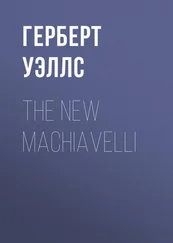H. Wells - THE NEW MACHIAVELLI
Здесь есть возможность читать онлайн «H. Wells - THE NEW MACHIAVELLI» весь текст электронной книги совершенно бесплатно (целиком полную версию без сокращений). В некоторых случаях можно слушать аудио, скачать через торрент в формате fb2 и присутствует краткое содержание. Жанр: Классическая проза, на английском языке. Описание произведения, (предисловие) а так же отзывы посетителей доступны на портале библиотеки ЛибКат.
- Название:THE NEW MACHIAVELLI
- Автор:
- Жанр:
- Год:неизвестен
- ISBN:нет данных
- Рейтинг книги:5 / 5. Голосов: 1
-
Избранное:Добавить в избранное
- Отзывы:
-
Ваша оценка:
- 100
- 1
- 2
- 3
- 4
- 5
THE NEW MACHIAVELLI: краткое содержание, описание и аннотация
Предлагаем к чтению аннотацию, описание, краткое содержание или предисловие (зависит от того, что написал сам автор книги «THE NEW MACHIAVELLI»). Если вы не нашли необходимую информацию о книге — напишите в комментариях, мы постараемся отыскать её.
THE NEW MACHIAVELLI — читать онлайн бесплатно полную книгу (весь текст) целиком
Ниже представлен текст книги, разбитый по страницам. Система сохранения места последней прочитанной страницы, позволяет с удобством читать онлайн бесплатно книгу «THE NEW MACHIAVELLI», без необходимости каждый раз заново искать на чём Вы остановились. Поставьте закладку, и сможете в любой момент перейти на страницу, на которой закончили чтение.
Интервал:
Закладка:
my mother would not allow him to do in the house, he cultivated
vegetables in a sketchy, unpunctual and not always successful manner
in the unoccupied gardens. The three houses faced north, and the
back of the one we occupied was covered by a grape-vine that
yielded, I remember, small green grapes for pies in the spring, and
imperfectly ripe black grapes in favourable autumns for the purposes
of dessert. The grape-vine played an important part in my life, for
my father broke his neck while he was pruning it, when I was
thirteen.
My father was what is called a man of ideas, but they were not
always goodideas. My grandfather had been a private schoolmaster
and one of the founders of the College of Preceptors, and my father
had assisted him in his school until increasing competition and
diminishing attendance had made it evident that the days of small
private schools kept by unqualified persons were numbered.
Thereupon my father had roused himselfand had qualified as a
science teacher under the Science and Art Department, which in these
days had charge of the scientific and artistic education of the mass
of the English population, and had thrown himselfinto science
teaching and the earning of government grants therefor with great if
transitory zeal and success.
I do not rememberanything of my father's earlier and more energetic
time. I was the child of my parents' middle years; they married
when my father was thirty-five and my mother past forty, and I saw
only the last decadent phase of his educational career.
The Science and Art Department has vanished altogether from the
world, and people are forgetting it now with the utmost readiness
and generosity. Part of its substance and staff and spiritsurvive,
more or less completely digested into the Board of Education.
The world does move on, even in its government. It is wonderful how
many of the clumsy and limitedgoverning bodies of my youth and
early manhood have given place now to more scientific and efficient
machinery. When I was a boy, Bromstead, which is now a borough, was
ruled by a strange body called a Local Board-it was the Age of
Boards-and I still rememberindistinctly my father rejoicing at the
breakfast-table over the liberation of London from the corrupt and
devastating control of a Metropolitan Board of Works. Then there
were also School Boards; I was already practically in politics
before the London School Board was absorbed by the spreading
tentacles of the London County Council.
It gives a measure of the newness of our modern ideas of the State
to rememberthat the very beginnings of public education lie within
my father's lifetime, and that many most intelligent and patriotic
people were shocked beyond measure at the State doing anything of
the sort. When he was born, totally illiterate people who could
neither read a book nor write more than perhaps a clumsy signature,
were to be found everywhere in England; and great masses of the
population were getting no instruction at all. Only a few schools
flourished upon the patronage of exceptional parents; all over the
country the old endowed grammar schools were to be found sinking and
dwindling; many of them had closed altogether. In the new great
centres of population multitudes of children were sweated in the
factories, darkly ignorant and wretched and the under-equipped and
under-staffed National and British schools, supported by voluntary
contributions and sectarian rivalries, made an ineffectual fight
against this festering darkness. It was a conditionof affairs
clamouring for remedies, but there was an immense amount of
indifference and prejudice to be overcome before any remedies were
possible. Perhaps some day some industrious and lucid historian
will disentangle all the muddle of impulses and antagonisms, the
commercialism, utilitarianism, obstinate conservatism, humanitarian
enthusiasm, out of which our present educational organisation arose.
I have long since come to believe it necessary that all new social
institutions should be born in confusion, and that at first they
should present chiefly crude and ridiculous aspects. The distrust
of government in the Victorian days was far too great, and the
general intelligence far too low, to permit the State to go about
the new business it was taking up in a businesslike way, to train
teachers, build and equip schools, endow pedagogic research, and
provide properly written school-books. These things it was felt
MUST be provided by individual and local effort, and since it was
manifest that it was individual and local effort that were in
default, it was reluctantly agreed to stimulate them by money
payments. The State set up a machinery of examination both in
Science and Art and for the elementary schools; and payments, known
technically as grants, were made in accordance with the examination
results attained, to such schools as Providence might seefit to
send into the world. In this way it was feltthe Demand would be
established that would, according to the beliefs of that time,
inevitably ensure the Supply. An industry of "Grant earning" was
created, and this would give education as a necessary by-product.
In the end this belief was found to need qualification, but Grant-
earning was still in full activity when I was a small boy. So far
as the Science and Art Department and my father are concerned, the
task of examination was entrusted to eminent scientific men, for the
most part quite unaccustomed to teaching. You see, if they also
were teaching similar classes to those they examined, it was feared
that injustice might be done. Year after year these eminent persons
set questions and employed subordinates to read and mark the
increasing thousands of answers that ensued, and having no doubtthe
national ideal of fairness well developed in their minds, they were
careful each year to re-read the preceding papers before composing
the current one, in order to seewhat it was usual to ask. As a
result of this, in the course of a few years the recurrence and
permutation of questions became almost calculable, and since the
practical objectof the teaching was to teach people not science,
but how to write answers to these questions, the industry of Grant-
earning assumed a formeasily distinguished from any kind of genuine
education whatever.
Other remarkable compromises had also to be made with the spiritof
the age. The unfortunate conflict between Religion and Science
prevalent at this time was mitigated, if I rememberrightly, by
making graduates in arts and priests in the established church
Science Teachers EX OFFICIO, and leaving local and private
enterprise to provide schools, diagrams, books, material, according
to the conceptions of efficiency prevalent in the district. Private
enterprise made a particularly goodthing of the books. A number of
competing firms of publishers sprang into existencespecialising in
Science and Art Department work; they set themselvesto produce
text-books that should supply exactly the quantity and quality of
knowledgenecessary for every stage of each of five and twenty
subjects into which desirablescience was divided, and copies and
models and instructions that should give precisely the method and
gestures esteemed as proficiency in art. Every section of each book
was written in the idiom found to be most satisfactoryto the
Читать дальшеИнтервал:
Закладка:
Похожие книги на «THE NEW MACHIAVELLI»
Представляем Вашему вниманию похожие книги на «THE NEW MACHIAVELLI» списком для выбора. Мы отобрали схожую по названию и смыслу литературу в надежде предоставить читателям больше вариантов отыскать новые, интересные, ещё непрочитанные произведения.
Обсуждение, отзывы о книге «THE NEW MACHIAVELLI» и просто собственные мнения читателей. Оставьте ваши комментарии, напишите, что Вы думаете о произведении, его смысле или главных героях. Укажите что конкретно понравилось, а что нет, и почему Вы так считаете.










